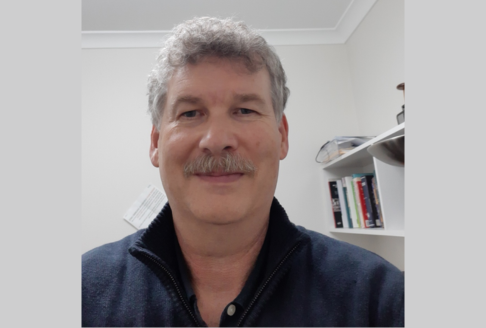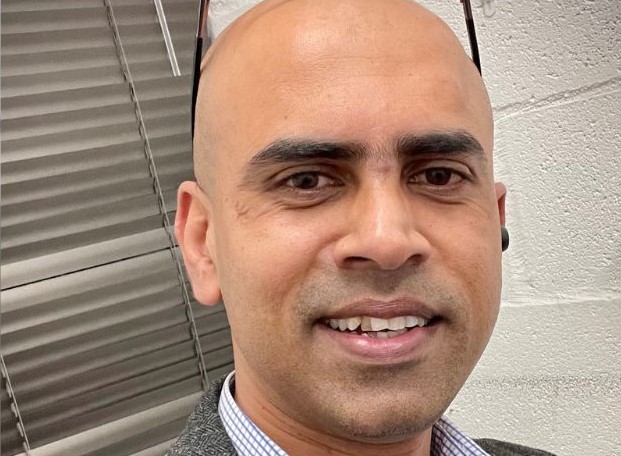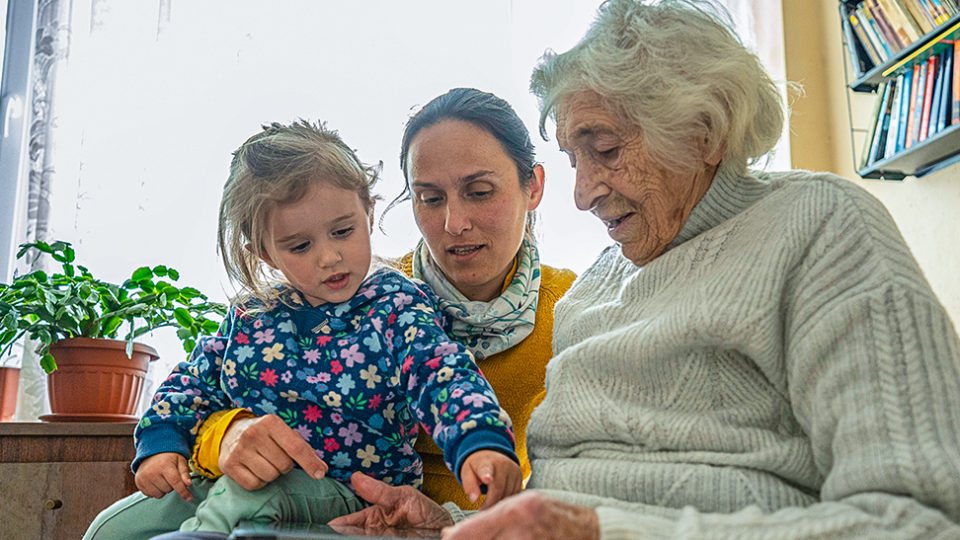Faces of Baptcare #44 | Meet David Ware, Spiritual Care Coordinator/Chaplain
- 08 Jun 2023

David is a much-loved member of staff at our Hedley Sutton Community in leafy Camberwell, Victoria. His bright and cheerful personality radiates warmth and positivity to all he meets – and his poetry is sure to put a smile on your face.
Read on to learn more about David’s work, why he loves working at Baptcare and enjoy reading some of his poetry!
Tell us about your work as a Spiritual Care Coordinator/Chaplain – what does a typical day look like for you (if there is such a thing)?
Some days are very different to others – over a week, I do many different things including:
- Creating and leading devotional services and a variety of resident interest programs, for example, weekly current affairs sessions and monthly ‘can of worms’ discussions.
- Providing emotional and spiritual support to our residents, staff and families.
- Coordinating and leading a team of spiritual care volunteers.
- Keeping up to date with required assessments and documentation.
Why did you decide to become a Spiritual Care Coordinator/Chaplain? And why did you decide to work in the aged care sector?
I am not sure I chose aged care—I think that in some strange way it (God?) chose me. I was walking the streets of Geelong reading water meters, using hardly any of my ability or gifts (although I did get very fit!) when the opportunity to become a Baptcare Chaplain arose. I wasn’t sure how I would go—but after a period of adjustment I found it fitted me quite well.
How long have you worked at Baptcare?
I commenced working with Baptcare in November 2011, so I have been with the organisation for more than 11 years. During this time, I have worked across three sites: the Western Metro Community Aged Care Office in Sunshine (as it was then), Strathalan Community (with a focus on Retirement Living) and our Hedley Sutton Community. I have also helped out at a few other sites from time to time.
Why do you like working at Baptcare?
One of the things I have most enjoyed about Baptcare is working with many wonderful people who really care about the people they work for and believe in the importance of what they do.
To me, Baptcare really does care about the residents, clients, consumers and communities we serve. It is good to feel that I am part of making a positive difference.
Have you always worked as a Chaplain?
Not always—although I have previously worked as a School Chaplain in public and private school settings. It does seem to have been a bit of a “sweet spot” where my gifts, personality and sense of vocation come together well.
Other jobs I have had:
- Braille Transcriber (I worked for over five years full-time and part-time in this role).
- Integration Aide work (undertaken part-time for four years with a visually handicapped high school student, while I completed a BA/B Theol double degree).
- Church Pastor (both as a solo/main pastor and as part of a team).
What did you want to be when you were growing up?
There was a time when I thought I would like to be a schoolteacher. I was dissuaded from this in Year 6 by a teacher who thought I was too shy to do this role. Looking back, I think that was a poor assessment of my capabilities and I have ended up doing a fair bit of teaching anyway!
I notice that you are a very natural performer in front of a big crowd and connect with ease – how did you develop those skills?
Thanks for the compliment! (I am actually quite shy).
I think it’s largely been a case of identifying the strengths that I have when it comes to connecting with a group (even a large group) and honing those skills through practice. Over the years, I have got a pretty good feel for what works well in a public setting and what doesn’t.
These are my tips:
- Find a “hook” for any brief speech of 3-4 minutes, for example, I have spoken about MAD (Make A Difference) volunteers.
- Don’t labour the point (longer is not always better—in fact, it can be worse).
- Use interesting stories as illustrations (stories that connect with people are a great communication tool. Jesus used a lot of stories).
- Where possible, break the message into smaller “bite size” pieces (in devotions, I generally have three sections that go for 4-5 minutes rather than one long message).
- Make sure the different parts of the message connect well (the sum of the whole should be greater than the sum of the parts).
- Have one main point which provides a focus for all the sub points.
- Make it interesting and keep a sense of humour.
- Connect with people’s own stories and experiences (i.e., I try to start where people are at—not where I think they should be).
Your poetry is wonderful! When did you develop a love of writing?
I have always been able to write rhymes, poems and song lyrics. But I generally need a reason to write.
Until 2020, most of my writing was done for the many short talks I created for devotional services I presented at Hedley Sutton.
However, when COVID hit in 2020, I had a conviction that if ever there was a time when I needed to get on the “front foot” with my writing this was it! So, I wrote a lot more poems from that time on.
(Editor’s note – here’s an excerpt from David’s piece ‘If God’ for your enjoyment):
Oh yes there’s been times when fired up, cranky
God’s upbraided the world for its brash hanky-panky
But still all in all, though it may pass as ordinary
His patience has been exemplar, extraordinary
Through all that does happen we still hear joy’s tune
The sun shines on brightly and so does the moon,
And fun does emerge from the strangest of places
God must be a prankster, to make all our faces.
He’s more than a judge, he’s a big-hearted dad,
With a laugh and a smile, to make our hearts glad.
And like the best earthly mother, who never gives in
He helps us to rise up and again to begin.
Yes God is a jokester, a weaver of tales
Who delights in our quirks and whose love never fails.
You ask me in earnest: How was this thought seeded?
Well I am still here, what more proof is needed!?
What else do you like to do in your spare time?
I am a bit of a sports tragic and follow the Geelong football club and get to matches when I can.
I play table tennis at home against one of my sons—and we have some epic matches. I am holding sway—just!
I enjoy getting down to Anglesea on the Surf Coast and to other places for short trips when I can.
I enjoy reading and am particularly interested in history and the insights it can provide into why people, communities and countries do the things they do.
I am part of a great small group—where we share life, prayer and faith together.
I like going to our local café or visiting places like Warrandyte that are renewing and life giving.
If you could invite anyone in the world along to a dinner party (living or dead – doesn’t matter), who would you invite and why?
That is a great question!
I am hoping to meet Jesus one day, so I will leave him off my dinner list!
Jonah: What was it like being swallowed by a whale? Did you learn anything from that experience?
Elvis Presley: What was it really like being “The King”? Would you have made all those B grade movies again if you had another chance?
Elizabeth 1 (Queen of England 1558-1603): What was it like being a powerful woman in a man’s world? Was being Henry VIII’s daughter a help or a hindrance? Did you regret that you never got married?
What’s your motto in life?
To leave the world and people I love and meet, better than I found them.
Thank you, David, for everything you do to support our valued residents, staff and volunteers at Baptcare.
If you would like to learn more about how Baptcare provides emotional and spiritual support through our network of pastoral carers and chaplains, click here.
Community news
-

Tips for dealing with life in the sandwich generation
This is part two in our blog series on the sandwich generation. Here are some tips for dealing with the carer’s squeeze experienced by a growing number of Australians, particularly women. Key points: Summary of challenges facing the sandwich generation Tips for dealing with the challenges System reforms needed
- 11 Jul 2025
-

Meet Suraj | Hospitality Manager Residential Aged Care
What makes a residential aged care community truly feel like home? It’s the perfect blend of a warm, inviting atmosphere, devoted and compassionate staff, and thoughtfully crafted meals that foster an undeniable sense of belonging. Today we meet Suraj Ligade, Baptcare’s Hospitality Manager, to explore how his passion for care and culinary excellence nourishes both the bodies and spirits of our treasured aged care residents.
- 10 Jul 2025
-

The sandwich generation phenomenon unpacked
Welcome to the first of two blogs on the theme of the sandwich generation in Australia. In this one, we’ll cover the definition of the sandwich generation, the different types of caring that fall within it and some of the issues those in the sandwich generation face. The second blog will cover tips for dealing with life in the sandwich generation
- 02 Jul 2025
